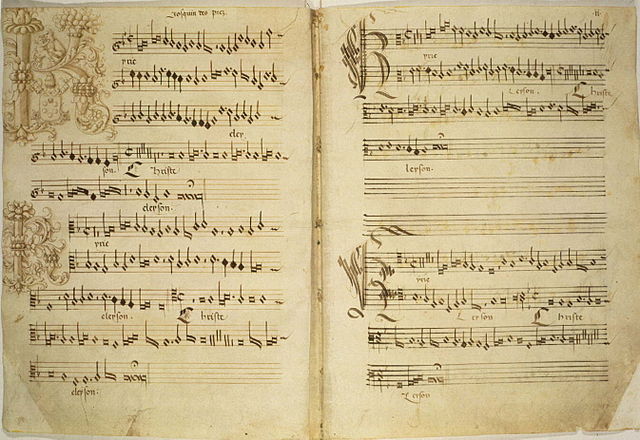Heinrich Isaac was a Netherlandish Renaissance composer of south Netherlandish origin. He wrote masses, motets, songs, and instrumental music. A significant contemporary of Josquin des Prez, Isaac influenced the development of music in Germany. Several variants exist of his name: Ysaac, Ysaak, Henricus, Arrigo d'Ugo, and Arrigo il Tedesco among them.
Illuminated chansonnier by Heinrich Isaac, showing the beginning of his four-voice motet Palle, palle; probably written in Florence in the 1480s and copied during that period. Palle (Italian for "balls") is a reference to the coat-of arms of the Medici family, his employers at the time.
Josquin Lebloitte dit des Prez was a composer of High Renaissance music, who is variously described as French or Franco-Flemish. Considered one of the greatest composers of the Renaissance, he was a central figure of the Franco-Flemish School and had a profound influence on the music of 16th-century Europe. Building on the work of his predecessors Guillaume Du Fay and Johannes Ockeghem, he developed a complex style of expressive—and often imitative—movement between independent voices (polyphony) which informs much of his work. He further emphasized the relationship between text and music, and departed from the early Renaissance tendency towards lengthy melismatic lines on a single syllable, preferring to use shorter, repeated motifs between voices. Josquin was a singer, and his compositions are mainly vocal. They include masses, motets and secular chansons.

A 1611 woodcut of Josquin des Prez, possibly copied from a now-lost oil painting made during his lifetime. There have been doubts concerning whether this depiction is an accurate likeness, see § Portraits.
Josquin probably served under Louis XII, who had captured the Sforzas, his previous employers.
Ercole I d'Este, an important patron of the arts, was Josquin's employer during 1503–1504.
Manuscript showing the opening Kyrie of the Missa de Beata Virgine, a late work. Rome, Biblioteca Apostolica Vaticana, Capp. Sist. 45, ff. 1v-2r.





